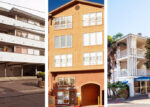Go with subsidized housing or limited equity housing co-op? This is the question facing the Housing Authority Board of Commissioners in Marin County on what to do with a run-down, rodent-infested public housing complex.
The board will consider two proposals to revamp the 300-unit Golden Gate Village at 59 Cole Drive in Marin City, the San Francisco Business Times reported.
The four-story affordable housing complex suffers from mold, vermin infestations, faulty wiring and tenants rights violations, according to multiple lawsuits filed over the past decade.
The Marin Housing Authority submitted a corrective action plan last year to the U.S. Department of Housing and Urban Development spelling out how it would fix its public housing problems.
A subcommittee of the commission, whose members are Marin County Board of Supervisors, recommended approving the MHA plan to invest $330 million into the hillside apartments, while retaining oversight. Its proposal would add job training, education and economic development.
A Residents Council at Golden Gate has pitched a plan for a green redesign of the complex and its conversion from subsidized housing into a limited equity housing co-op. It would need $26 million in financing.
Both plans would reposition the public housing property according to HUD’s Section 18 Demolition and Disposition process, which allows agencies to raze or redevelop properties with access to private capital.
Marin housing officials want to finance a renovation of Golden Gate Village with a permanent loan, a low income housing tax credit and a development subsidy. A tax credit would require an investor to own the complex, with the MHA to serve as general partner and run the place.
Backers of the MHA plan contest that maintaining the complex as general-purpose rental housing means it’s open to anyone who may need an affordable place to live. The waiting list for Golden Gate Village exceeds 700 people, while 9,200 households in Marin County don’t have access to affordable homes.
The same group assert that the co-op conversion and financing proposal is too risky and could prevent much-needed investment in the property. The MHA could also lose federal funding if it misses deadlines tied to its corrective action plan.
The Resident Council said it has identified funding sources to bridge the $26 million financing gap, including Community Development Block grants related to historic preservation, climate change and sustainability grants, as well as funding from foundations and from the county.
Conversely, the co-op plan backers argue that turning the units into owner-occupied housing provide a means for self determination and autonomy for the mostly Black residents who live at Golden Gate.
Resident Council member Nancy Binzen said the county’s plan maintains “residents in a renter-only position — it’s the continued subservient role.
“It continues to perpetuate the failed model that MHA has followed now for many years,” she said, “which has resulted in the mismanagement of the property and in HUD having given them failing physical scores and now demanding that they come up with a corrective action plan.”
— Dana Bartholomew
Read more

